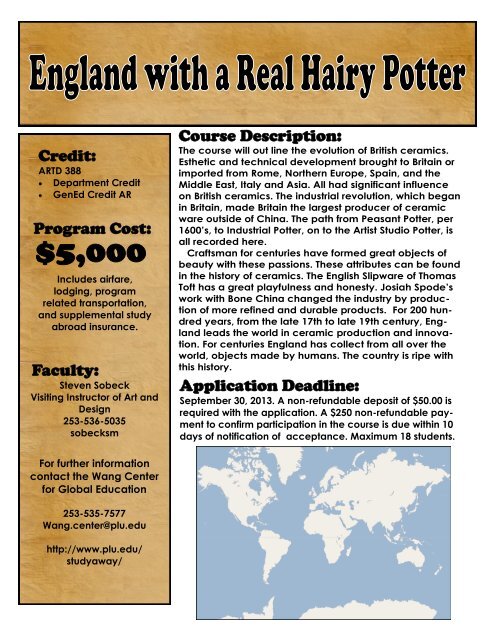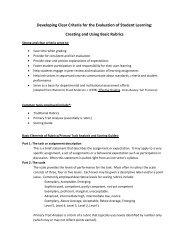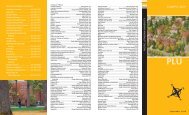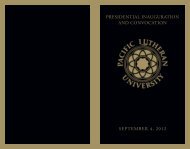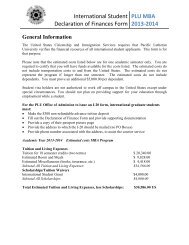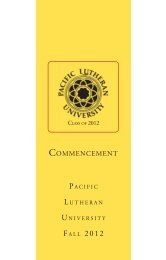Study the evolution of British ceramics, from rudimentary Stone Age ...
Study the evolution of British ceramics, from rudimentary Stone Age ...
Study the evolution of British ceramics, from rudimentary Stone Age ...
You also want an ePaper? Increase the reach of your titles
YUMPU automatically turns print PDFs into web optimized ePapers that Google loves.
Credit:<br />
ARTD 388<br />
Department Credit<br />
GenEd Credit AR<br />
Program Cost:<br />
Includes airfare,<br />
lodging, program<br />
related transportation,<br />
and supplemental study<br />
abroad insurance.<br />
Faculty:<br />
Steven Sobeck<br />
Visiting Instructor <strong>of</strong> Art and<br />
Design<br />
253-536-5035<br />
sobecksm<br />
Course Description:<br />
The course will out line <strong>the</strong> <strong>evolution</strong> <strong>of</strong> <strong>British</strong> <strong>ceramics</strong>.<br />
Es<strong>the</strong>tic and technical development brought to Britain or<br />
imported <strong>from</strong> Rome, Nor<strong>the</strong>rn Europe, Spain, and <strong>the</strong><br />
Middle East, Italy and Asia. All had significant influence<br />
on <strong>British</strong> <strong>ceramics</strong>. The industrial r<strong>evolution</strong>, which began<br />
in Britain, made Britain <strong>the</strong> largest producer <strong>of</strong> ceramic<br />
ware outside <strong>of</strong> China. The path <strong>from</strong> Peasant Potter, per<br />
1600’s, to Industrial Potter, on to <strong>the</strong> Artist Studio Potter, is<br />
all recorded here.<br />
Craftsman for centuries have formed great objects <strong>of</strong><br />
beauty with <strong>the</strong>se passions. These attributes can be found<br />
in <strong>the</strong> history <strong>of</strong> <strong>ceramics</strong>. The English Slipware <strong>of</strong> Thomas<br />
T<strong>of</strong>t has a great playfulness and honesty. Josiah Spode’s<br />
work with Bone China changed <strong>the</strong> industry by production<br />
<strong>of</strong> more refined and durable products. For 200 hundred<br />
years, <strong>from</strong> <strong>the</strong> late 17th to late 19th century, England<br />
leads <strong>the</strong> world in ceramic production and innovation.<br />
For centuries England has collect <strong>from</strong> all over <strong>the</strong><br />
world, objects made by humans. The country is ripe with<br />
this history.<br />
Application Deadline:<br />
September 30, 2013. A non-refundable deposit <strong>of</strong> $50.00 is<br />
required with <strong>the</strong> application. A $250 non-refundable payment<br />
to confirm participation in <strong>the</strong> course is due within 10<br />
days <strong>of</strong> notification <strong>of</strong> acceptance. Maximum 18 students.<br />
For fur<strong>the</strong>r information<br />
contact <strong>the</strong> Wang Center<br />
for Global Education<br />
253-535-7577<br />
Wang.center@plu.edu<br />
http://www.plu.edu/<br />
studyaway/


